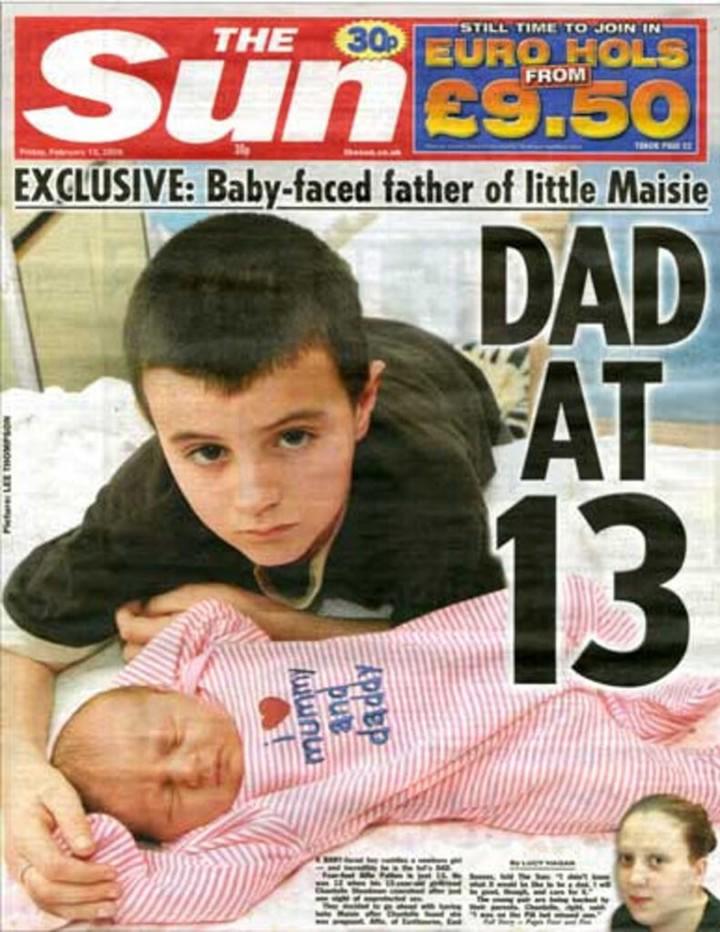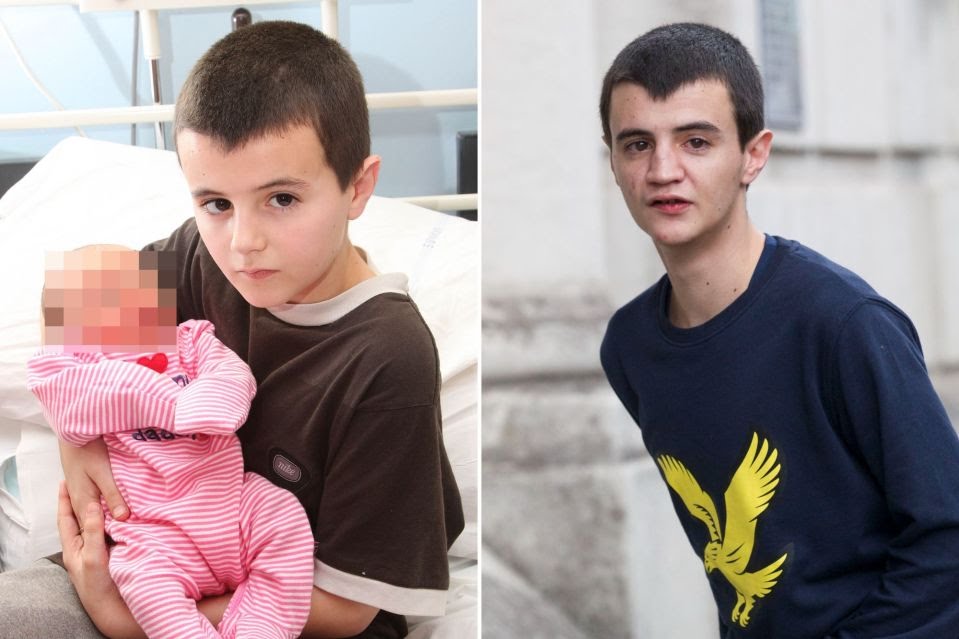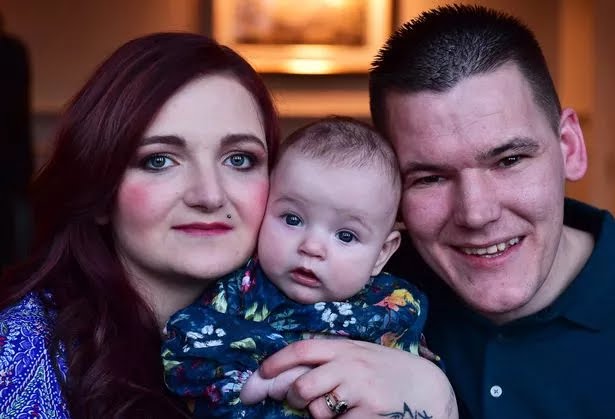CELEBRITY
Britain’s youngest father gave birth at the age of 13 without her family knowing, and more surprisingly, the baby’s father…..see more

Alfie Patten became a national sensation in 2009 when, at just 13 years old, he was declared Britain’s youngest father after his girlfriend, Chantelle Steadman, gave birth to their daughter, Maisie.
The case not only shocked the nation but also ignited debates about teenage pregnancy, sexual education, and the responsibilities faced by young parents.
Alfie’s story offers a compelling lens through which we can examine the complexities of raising a child at such a young age, especially in terms of emotional, physical, and social challenges.
The Birth of a National Story
In 2008, when Alfie Patten was just 12 years old, he began a relationship with Chantelle Steadman, a girl two years older than him.
After a series of unprotected sexual encounters, Chantelle became pregnant. She kept the pregnancy secret from her parents for several months, and it wasn’t until January 2009 that the world learned of the pregnancy and Alfie’s involvement.
When Chantelle gave birth to a daughter, Maisie, in February 2009, DNA testing confirmed that Alfie was indeed the biological father, making him the youngest father in Britain at the time.
The news hit the headlines quickly, and Alfie’s life was thrust into the spotlight.
For Alfie, this news was an overwhelming and confusing experience.
At 13, he was still a child himself, yet he was suddenly faced with the adult responsibility of raising a child.
Despite his youth, Alfie was adamant that he wanted to be a good father, although it was unclear if he fully understood the enormity of what this would involve.
The Complexities of Fatherhood at 13
Alfie’s situation highlighted the difficulties faced by young fathers, and his story raised important questions about the support structures available to teenage parents.
The emotional and psychological impact of becoming a father at such a young age is profound.
Alfie, who was still going through puberty himself, faced challenges with his own development and now had to take on the responsibility of a child.
At 13, Alfie had not yet fully developed the coping skills necessary to navigate the stresses of parenthood.
His cognitive and emotional maturity was still that of a typical teenager, and raising a child required a level of responsibility and foresight that many adults struggle with.
Health and Social Impacts
Physically, Alfie was still in the early stages of puberty, and the strain of fatherhood could have had an impact on his mental and physical health.
Adolescents, especially those who are not yet fully developed, may struggle with the emotional toll of raising a child, leading to stress, anxiety, and other mental health issues.
These challenges are compounded by the fact that, unlike adult fathers, young fathers like Alfie often lack the resources and knowledge to navigate their roles effectively.
Furthermore, young fathers tend to have fewer social supports.
Many teenage parents feel isolated, as their peer groups may not understand their responsibilities or may view them with judgment.
Alfie’s case was no different. His peers were still in school and focused on their own lives, while Alfie had to balance his education with the intense pressures of fatherhood.
In some ways, Alfie was caught between two worlds—still a child, yet forced to mature rapidly.
The Role of Education and Social Support
A crucial element in Alfie’s story was the role that education and social services played in his life.
At 13, Alfie was still in school, and many experts raised concerns about how he would be able to continue his education while caring for a newborn.
Teenagers who become parents often experience interruptions in their schooling, which can have long-term consequences on their educational and employment prospects.
Support from family, friends, and local social services is crucial for young parents.
Alfie’s parents were supportive, though they too were dealing with the shock of their son becoming a father at such a young age.
In an ideal scenario, young fathers like Alfie would have access to comprehensive support systems, including counseling, parenting classes, and financial assistance.
However, many teenage fathers lack access to these resources, which can hinder their ability to provide for their children and fulfill their roles as parents.
The Paternity Controversy
In 2010, a twist to the story emerged when a paternity test revealed that Alfie might not actually be Maisie’s biological father after all.
Instead, it was revealed that another boy, Tyler Barker, was the biological father.
The confusion stemmed from the fact that Chantelle had been involved with both Alfie and Tyler during a short period of time.
While the revelation about the paternity of Maisie was significant, it didn’t change the reality of Alfie’s experience as a young father.
Despite the fact that another boy was Maisie’s biological father, Alfie had already bonded with her and taken on the role of fatherhood.
The situation underscored the complexities of teenage relationships and the difficulties of determining parental responsibilities when young people are still figuring out their own identities.
Moving Forward: The Long-Term Impact
The aftermath of Alfie Patten’s story serves as a reminder of the long-term impact of teenage parenthood.
For Alfie, the public scrutiny and the early responsibilities of fatherhood took a toll.
His relationship with Chantelle eventually ended, and he faced the challenges of growing up in the public eye.
Alfie later spoke about his regret at becoming a father at such a young age, acknowledging that he had not been prepared for the responsibility.
The challenges of raising a child as a teenager have long-lasting effects not just on the young parent but also on the child.
Children born to teenage parents are more likely to experience poverty, neglect, and other social disadvantages.
However, Alfie’s story also highlights the resilience of young parents.
Despite the difficult circumstances, many young fathers, like Alfie, continue to provide for their children and grow into their roles, even if they start with limited resources and support.
Conclusion
Alfie Patten’s case remains one of the most high-profile examples of teenage fatherhood in the UK, and it serves as an important case study in the complexities of raising a child at such a young age.
The emotional, physical, and social challenges of being a father at 13 are profound, and young parents like Alfie often find themselves in situations where they must quickly mature in order to meet the needs of their child.
Alfie’s story is a reminder of the importance of early education, comprehensive sexual education, and adequate support systems for young parents.
While the situation was undeniably difficult, it also provided valuable insights into the realities of teenage parenthood, shedding light on the need for better resources and support for young fathers as they navigate the complexities of early parenthood.







